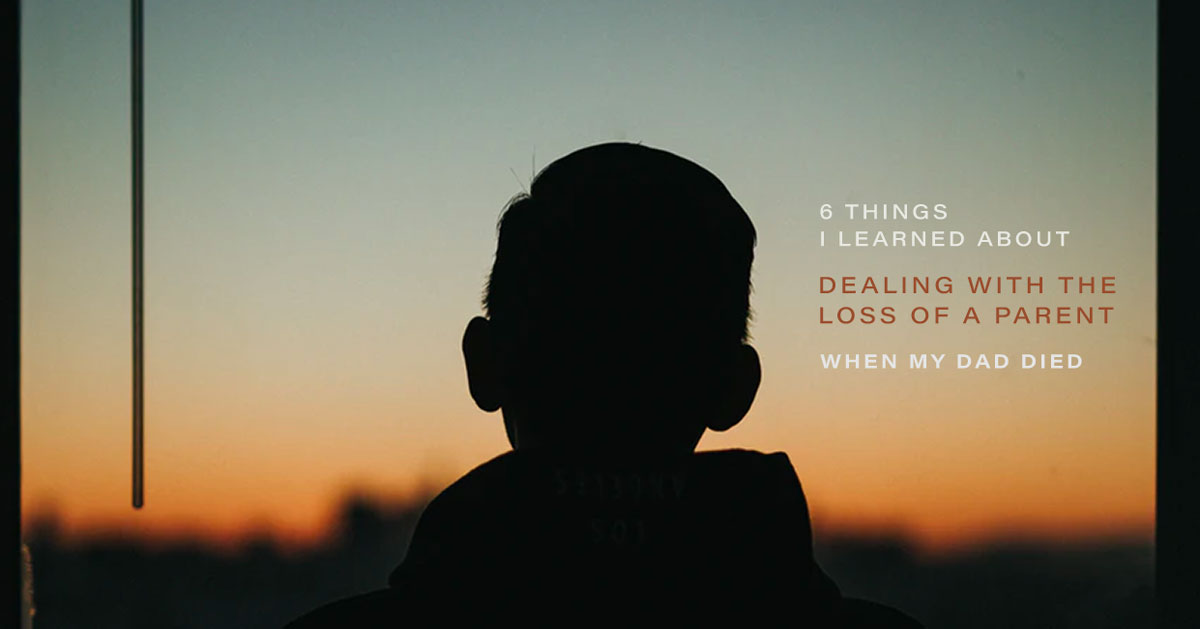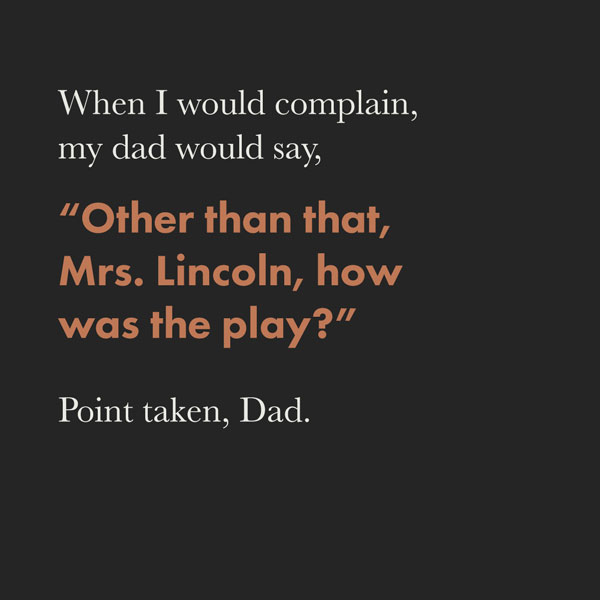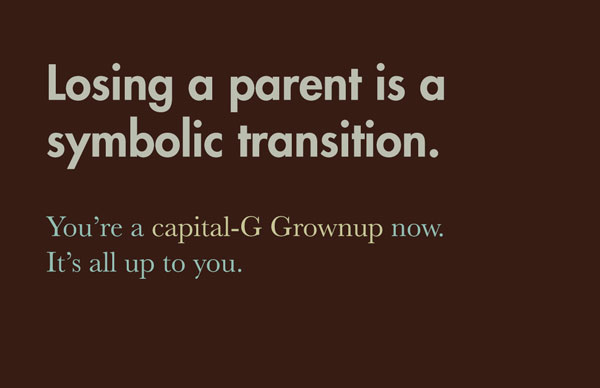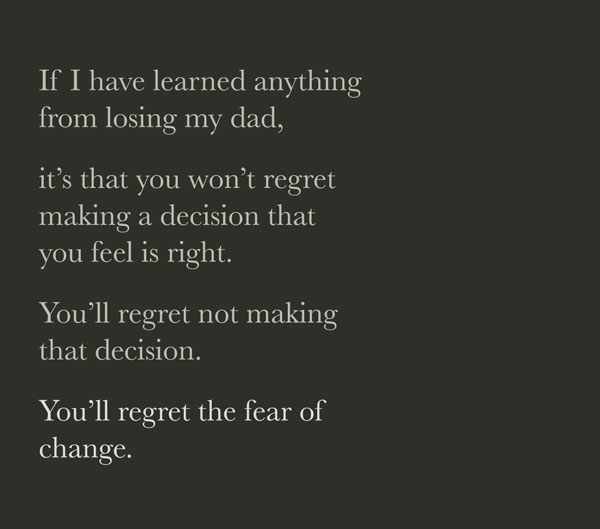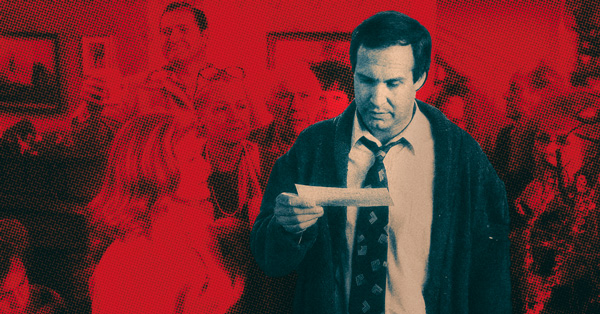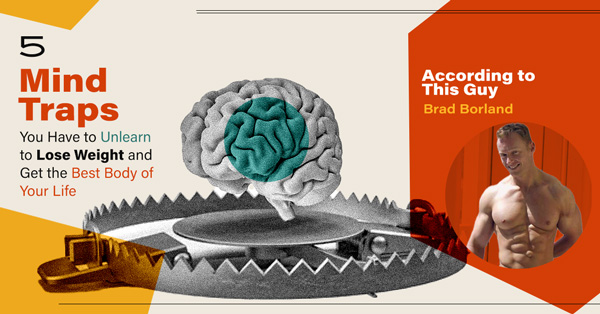My dad died when I was 25. One night in September, I unwittingly left my phone on silent. When I woke up, I had fourteen missed calls from my mom, and when I called her back, she told me my dad had died of a heart attack.
I lived the kind of life where nothing bad ever happened. Sheltered. The idea that something could go tragically wrong like this never crossed my mind.
It was my closest experience with grief, and I was confused, and scared, and I wasn’t sure I could handle it. I didn’t want to cry.
Men don’t cry. Because we’re tough, right?
But J. Scott Janssen says that, based on the research, men may be more likely to repress their grief and allow it to manifest itself in harmful ways, like stress, substance abuse, and suicide.
Your grief will overwhelm you. If you squirrel it away, it will rot out your guts.
Don’t run from it. Dive into it headfirst. Getting over this kind of loss is an ongoing process, forever.
Here are some tips that have helped me so far.
Prioritize your family
The best thing you can do for yourself is to do things for others. You’ll be in the center of attention when your parent dies, but your whole family feels this loss, too. Connect with them. Share stories, talk about how you’re feeling, and try to have a laugh or two.
And don’t forget that there’s work to be done. I found comfort in making myself totally available for my mom. I was shocked by how much needs to be done when a person dies – funeral arrangements, changing of accounts, and so on – and I didn’t want her to feel like she was doing that alone. She did the heavy lifting, and has been doing it since, but I volunteered to do whatever I could in those first few days.
When you lose a parent, you will feel like you have no control of the situation. Keeping busy by helping make funeral decisions, offering to read a eulogy, and running menial errands allowed me to regain some sense of control. It’s a healthy distraction when you need it the most. It also has the added benefit of easing the burdens of those around you. No one can do this by themself.
Share your experience
Your natural inclination will be to wall off your emotions inside you. Maybe you feel like you need to be tough, or maybe it’s just too painful to deal with. The reality is that grief is only too painful to deal with if you try to deal with it alone.
“You can't numb those hard feelings,” says Brene Brown, “without numbing the other affects, our emotions. You cannot selectively numb. So when we numb those, we numb joy, we numb gratitude, we numb happiness.”
Allow yourself to feel whatever it is you feel. Sadness, anger, desperation, guilt, all of these are normal parts of the grieving process. Feel them, and express them.
The most important part of dealing with trauma is moving it outside of yourself. This happened to you, yes, but you’re not alone.
The majority of us will have to face the loss of a parent at some point in our lives. What this means, in a perverse way, is that you have something in common with a lot of other people. You may not even be aware that other people you know have felt a loss similar to yours.
Vulnerability can offer them strength. By sharing your experience with death and loss, you make it okay for others to do the same. It’s a powerful feeling.
Find whatever way is best for you to share what happened. For me, as a writer, the best way to share my experience has been through my work. Writing this post, even two and half years after my dad died, is part of my healing process.
It can also be as easy as talking. The Dinner Party is “a worldwide community of 20- and 30-somethings who have each experienced the loss of a parent, partner, child, sibling, or close friend”. See if there’s a group meeting near where you live. If not, start one.
After I found out about my dad, I was pacing around on the sidewalk waiting to be picked up to go to the airport. A man approached me asking for change. Instead I told him everything, and he gave me a big hug and told me, “life happens while you’re making other plans.” I still can’t believe that happened.
Everything in your body will scream at you not to talk about this, because maybe it could hurt you. Look this impulse in the eye, and talk about it anyway.
Get therapy
In our recent article about getting over a breakup, we suggested that a therapist “will be a sounding board and a dose of reality in a way that your friends and family might not be.”
Sit down with a therapist as soon as things have calmed down. Even if you only go to a few sessions, and even if you don’t think you need it (especially if you don’t think you need it). Give yourself a neutral space to follow your feelings, and maybe learn about yourself in the process.
The beautiful thing about seeing a therapist is that they have no stake in the outcome. You can say whatever you want in that room. You might find yourself saying things that were buried so deeply that you’re revealing them even to yourself. This awareness is a form of cleansing that helps you move forward. You have the rest of your life to live.
This was my biggest mistake when my dad died. I refused to go see a therapist for almost a year. In the process, my depression and anger ate me alive from the inside, demolished the relationship I was in at the time, and left me significantly worse off.
They say if you try to save a drowning man, he will just take you with him. People aren’t always going to feel sorry for you. I didn’t get the help I needed, and for the people I loved most I was a nightmare to be around.
I’ve been going to therapy now for a year and a half, and that weekly outlet for my most complicated feelings has turned into something I look forward to.
Share your feelings in private
While it’s important to share your feelings with other people, no one will ever truly understand how you feel except you. Your experience is unique.
As you grieve, you’ll encounter some emotions that will surprise or frighten you. You’ll feel guilty about some of these emotions. Maybe you have regrets about how you approached your relationship with the parent you lost. Or maybe there were some problems in the relationship that went unacknowledged.
These emotions will feel dangerous, but that’s no reason not to address them. Instead, explore them in private.
Keep a journal (sound familiar?) and fill it with your deepest thoughts. Take a trip to the mountains or the desert and go on a long hike with no one around. Go to a country where you don’t speak the language and get lost in your own little world.
Or write a letter to your dead loved one, revealing everything that you feel, and then throw it into your fireplace.
How you do this doesn’t matter. The key is to learn to be honest and open not just with others, but with yourself. Practice letting your guard down and seeing your emotions for how they really are.
Connect with the one you lost
Don’t avoid thinking about your lost loved one. Particularly if they died suddenly, it can feel like you are somehow keeping them around by refusing to acknowledge that they’re gone.
When we were setting up my dad’s funeral, my mom and I spent hours going through old photos. She showed me one from their wedding that I had never seen before, where she looked like a professional model and he looked like he had just won the lottery. He was smiling like he thought he was going to wake up from a dream.
Look, we’re all going to die. But death is sad because it’s the end of all the goodness that came before it. You’ll drive yourself crazy if you dwell only on your loss, and ignore everything that made that relationship worthwhile.
When I would complain, my dad would say, “Other than that, Mrs. Lincoln, how was the play?” Point taken, Dad. Stay positive.
The best way to honor and remember the dead is to think of them often.
My dad made me a Red Sox fan. On the anniversary of his death, we got the whole family together at Fenway Park for a game, and my mom had the idea of getting his name on the jumbotron. It wasn’t sad to see his name up there. It was a party.
Your parents made you who you are. Embrace your heritage.
Use this as a chance to reflect on your life, and to move forward
You’re going to hear this a lot, but life is short. And it will never seem shorter than when a parent dies.
Weren’t you just teaching me to fish? Didn’t you just give me your old Cream cassettes? Weren’t we just planning a trip to the French Open? Where did you go?
Over time you’ll feel more comfortable with your grief. But understand this: it will never feel okay. You’ll always feel like there’s a big fat chunk of you missing.
The best way to repair it is by living the truest life you can live. Evolve. Use this brush with death to create whatever inertia you need to take the next step in your life.
Have you been ignoring your gut while it’s trying to tell you something? This is the time to follow it. Losing my dad helped me finally commit to being a writer.
Have you been avoiding a big decision? This is the time to make it. After my dad died, I did something I’d been wanting to do for years and moved to Austin.
Have you been waiting and waiting for the right time to do something, but always feeling like the right time is tomorrow? The right time is now. I always knew I wanted a tattoo. And when I lost my dad, I finally gave myself permission to do it (it helps that he’s not around to be upset about it).
If I have learned anything from losing my dad, it’s that you won’t regret making a decision that you feel is right. You’ll regret not making that decision. You’ll regret the fear of change.
Losing a parent is a symbolic transition. You’re a capital-G Grownup now. It’s all up to you. How are you going to live?
Call your parents today
No one is ever ready to grieve for a parent. No matter if they have a heart attack in the middle of the night or battle chronic illness throughout your life, when your parent dies you will feel like you’re spacewalking without a tether.
Trust yourself, and trust your emotions. You’re as ready for this as you’ll ever be.
At the risk of sounding like an old man, I’ll leave you with this: enjoy your parents while you can.
When my dad died, we didn’t bother to charge his cell phone. It drained slowly, beating back calls from oblivious telemarketers, until it died for good. Before we disconnected his number, in a drunken haze, I sent my dad a text. And it just hung there, never delivered, only ever to be read by me.
So call your parents. Call your parents today. Call your parents right now. Tell them you love them. Some morning you will wake up and not have another chance.



